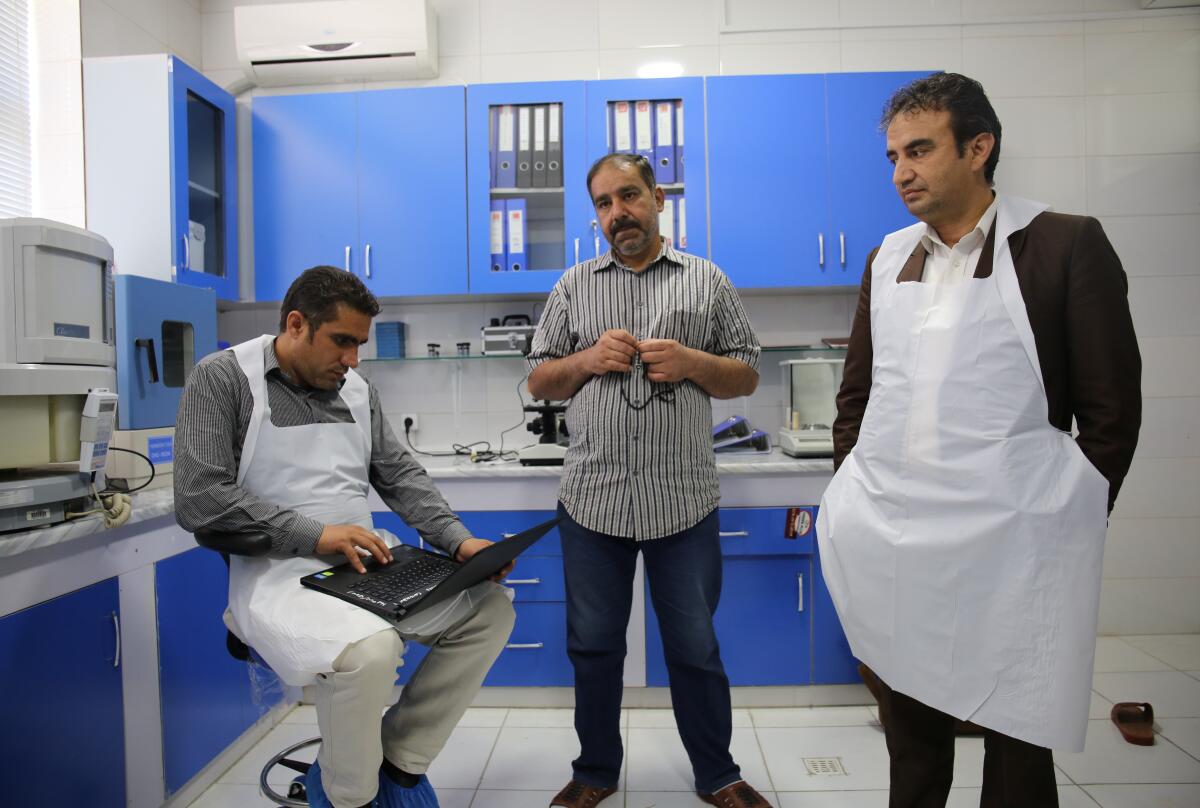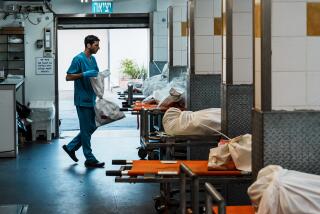Inside Afghanistan’s main forensic lab: Four scientists, one microscope

- Share via
KABUL, Afghanistan — When a suicide bomber targeted a wedding hall in the Afghan capital last week, killing at least 80 people, many of the bodies were brought to a dilapidated two-story block on the perimeter of Kabul.
This is the Forensic Medicine Directorate, Criminal Techniques Department, the only functioning criminal forensic laboratory in Afghanistan, where a team of four molecular biologists juggles hundreds of cases a week, including victims of rape, drug overdoses, homicide, and bombings.
The small department has basic facilities and 30-year-old equipment, and no DNA testing capability. After the Aug. 18 wedding hall attack claimed by the militant group Islamic State, body parts arrived in fragments. The scientists struggled to determine the victims’ identities using dental patterns, fiber analysis and other techniques before handing the bodies over to families.
The bodies were in such bad condition that the examiners faced “many challenges to distinguish between male and female organs,” said one of the scientists, Muhammad Rehman Shirzad.
As peace talks with the Taliban gain momentum and the U.S. nears an agreement to withdraw half of its troops from Afghanistan, continued attacks by the Taliban, Islamic State and other armed opposition groups threaten to overwhelm the small laboratory, a division of the Public Health Ministry.
The department opened 38 years ago as a small office inside Kabul University. Its purpose was to promote rule of law and the professionalism of the police, said Farid Ullah Rahiq, who joined four years ago as the director.
Despite the meager financial and technical support for the department, the biologists say they are handling five times as many cases as a decade ago, owing in part to a rise in gender-based violence and sexual crimes.
“Some days as many as 30 reports come in,” said Khalil Ahmad Pashtoonyar, a forensic molecular biologist. “Women are fighting oppression and crimes against them, and more are reporting these incidents to the police now.”
When U.S. troops left Bagram Airfield north of Kabul in 2014 as part of a military drawdown, thousands of dollars’ worth of U.S. forensic equipment was locked away in the Interior Ministry, out of the reach of the forensics team. Shirzad said the Americans could have helped the department by handing over the equipment and showing the scientists how to use it.
“We don’t have the specialists to fix it, we don’t have enough forensic DNA specialists to operate it, and we don’t have the access codes to activate the working equipment,” he said.
In 2018, the department received a small injection of cash from the Public Health Ministry to open Afghanistan’s first DNA analysis laboratory. But a year later, the equipment has not arrived and the DNA forensic lab remains closed while the team waits on the Afghan government’s promises.
In the meantime, the department sends most DNA cases to Canada, an expensive and drawn-out procedure. The tissue processor works one day, is broken the next. The scientists lack the equipment needed to conduct fiber and hair analysis as well as drug analysis, a major shortfall in a country with a growing drug abuse problem.
The scientists share a single specialized microscope, the only one of its kind in the country, a gift from Germany when the lab opened nearly four decades ago.
“The magic machine,” Shirzad calls it. “I love it, but the lab only has one, and we need 10.”
Shirzad specializes in cold cases. He recently worked on the case of a woman who died about five years ago. Police treated the case as a rape and homicide and identified a suspect: the brother of two women who were at the scene where the woman’s body was found.
All three were arrested and jailed despite declaring their innocence.
Shirzad happened to come across the case and found the lab still had access to the victim’s DNA samples. He sent the samples to Canada for testing. The tests found no sign of the suspect’s DNA, nor any evidence that would confirm the victim had been raped.
The man and his sisters were released from jail two months ago. No one else has been arrested in the case.
Shirzad said that case reflected how Afghan authorities regularly fail to request DNA analysis or to adequately collect and examine criminal evidence. Unlike in many countries, the forensic specialists are barred from crime scenes, meaning evidence is damaged or can be tampered with before it reaches them, particularly in cases where police or government officials are among the accused.
“We can’t say the system is clean of corruption. The evidence is getting passed around,” Rahiq said. “But the forensic lab is on one side of the truth. If we see truth, we expose it.”
The department also serves another purpose for the overwhelmed police force: as a temporary morgue. Its two refrigerator units are often used to store bodies when other morgues overflow.
“The more support the forensic department gets, the more our nation will progress,” Shirzad said. “Donors and the Afghan government support the high courts, police stations and national security, but these institutions cannot progress without us.”
Still, Shirzad said, the small team retains hope of delivering justice for victims of crime.
“This is our job,” Shirzad said. “We do what we do for the truth, in order to find the truth. We have a responsibility to our country.”
Billing is a special correspondent.
More to Read
Sign up for Essential California
The most important California stories and recommendations in your inbox every morning.
You may occasionally receive promotional content from the Los Angeles Times.













